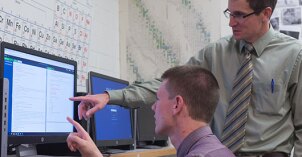
Getting to Know You
The Physics Department offers students a solid foundation in both classical and modern physics. Geophysics students take an additional 12 credits in geology. Because the field of geophysics is so broad, you can tailor your courses for your future career.
Faculty are always on hand to help guide students throughout their coursework and experiences on campus. Our courses encourage strong interaction, helping students get to know the faculty personally. Students have the chance to be mentored towards a future career path that will be best suited and rewarding to them.
Faculty are always on hand to help guide students throughout their coursework and experiences on campus. Our courses encourage strong interaction, helping students get to know the faculty personally. Students have the chance to be mentored towards a future career path that will be best suited and rewarding to them.
"The faculty dedicate so much time and energy for their students to make sure we are receiving the best quality of education that the school can offer. They are amazing advisers and give guidance and counsel to their students whether it is related to the major or just personal life and encourage students to do what they feel is right."
SAMANTHA G.,
BYU-I GRADUATE
Highlighted Career Paths
Graduates with a degree in Physics, with an emphasis in Geophysics, have a wide array of rewarding careers before them. Check out some of the top careers students get with this degree or explore more career options in I-Plan.
Geophysicist
Geophysics is the application of physics to study the Earth, oceans, atmosphere and near-earth space. Geophysicists can develop in a broad range of careers, including those in natural resource exploration, satellite based Earth observation, natural hazard mitigation, archaeological studies, conservation and climate studies, government policy and military applications.
Meteorologist/Remote Sensing
Meteorologists use science and math to understand and predict weather and climate. They also study how the atmospheric and weather conditions affect the earth and its human inhabitants.
Seismologist
Seismologists are earth scientists, specialized in geophysics, who study the genesis and the propagation of seismic waves, or earthquakes, in geological materials. These geological materials can range from a laboratory sample to the Earth as a whole.
Getting Started in this degree
If you are interested in Geophysics, start with one of the following major-specific courses







